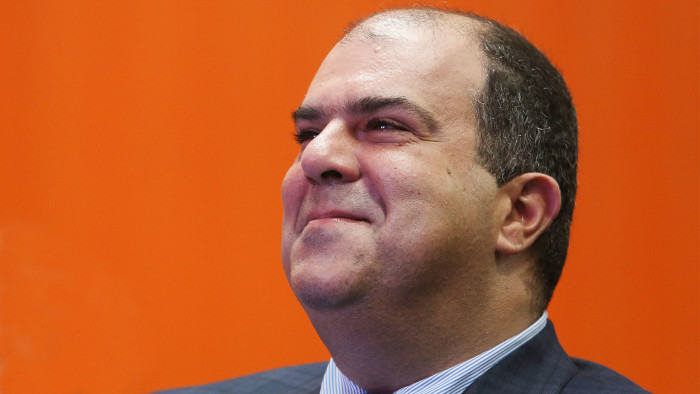Foundations: The easy way to charity

Roula Khalaf, Editor of the FT, selects her favourite stories in this weekly newsletter.
Last month, Sir Stelios Haji-Ioannou hosted a cocktail party, funded by his philanthropic foundation, at his London office, bringing together a few dozen wealthy and influential expatriates from both sides of the Cyprus divide. Attendees sipped expensive wine, nibbled canapés and talked about business.
“Not politics,” says Sir Stelios, the Greek-Cypriot billionaire who founded easyJet in 1995 when he was 28.
But this was not a casual get-together. Sir Stelios is bent on promoting the reunification of Cyprus’s Greek and Turkish halves and he believes that commerce offers the most effective route.
In total, Sir Stelios, who was born in Greece, educated in London and now lives in Monaco, believes he has committed about €2m to the bicommunal project, as it is known, over the past eight years. It is a central goal of his Stelios Philanthropic Foundation, which he set up about five years ago.
This is an entrepreneur who is known for his pugnacity, whether it is defending the garishly orange easyGroup brand (on the website is a prominent warning, labelled “brand thieves”) or demanding that easyJet, of which he is no longer a director but still controls 38 per cent, raises its dividend.
Less well known is how much of the money earned from licensing the easyGroup brand — such as the agreement with Fastjet Tanzania — has been spent philanthropically.
Last year, according to Companies House, the UK’s registrar of companies, easyGroup made £7.65m in pre-tax profits and paid £2.5m into the Stelios Philanthropic Foundation. The previous year, pre-tax profits were £6.9m and it paid £1.4m to the foundation. Initially, says Sir Stelios, who by his own reckoning spends about a third of his time on charitable projects, the donations were random and “the money [for projects] came out of my back pocket”.
But as easyGroup has become more profitable, the donations into the foundation have become more regular. Where the money goes is less easy to categorise.
The Foundations’ priorities are loosely billed “Scholarships, Entrepreneurship, Environment and Food from the Heart”, with a geographical focus on Greece, Cyprus and the UK. This encompasses a range of issues, with £68,000 going, for example, to the World Wildlife Fund last year.
“My family and I made money from transport businesses. There is an element of guilt. One of my father’s ships had an accident [in 1991 during routine maintenance]. I learned we have to be careful of the environment,” Sir Stelios explains.
His first project was in education. In 2006, he pledged to fund scholarships for 10 undergraduates a year at the London School of Economics and 10 postgraduates at Cass Business School, where the businessman studied. About 200 scholarships have been awarded so far.

This year, Sir Stelios is hosting a celebration in Monaco at which he will ask the alumni to put their hands in their pockets and set up their own scholarship schemes. He will help, he says, by matching their donations.
Sir Stelios’s father, a self-made shipping magnate, was a big believer in education and his son follows suit. But the themes of commerce and entrepreneurship pervade the younger Haji-Ioannou’s charitable efforts.
A decade ago, in the year he was knighted for services to entrepreneurship, he started a £50,000 Leonard Cheshire award for disabled entrepreneurs in the UK.
“I was subliminally influenced by my father who was in a wheelchair for the last 10 years of his life. I could see how things became more complicated. It is inspiring if someone is disabled and can still start a business. And I have discovered how difficult it is [for disabled people] to get employment.”
Entrepreneurs create jobs and help society by building economies, he says. But grants for business “are also uncontroversial”.
The Stelios bicommunal Cyprus award, which promotes island-wide co-operation between Turkish-Cypriots and Greek-Cypriot entrepreneurs by awarding up to 30 prizes of €10,000 a year, opened conversations about crossing the divide in Cyprus at times when the issue was simply not talked about.
Now, Sir Stelios thinks the chances of reunification look better than for decades and he has broadened the remit of the grant. Prizes go to anything that promotes unity in the community through sports, science or the arts.

Sir Stelios’s favourite effort at the moment, though, is Food from the Heart, which hands out free lunchtime snacks to the needy in Greece and Cyprus as well as the migrants arriving in the Aegean. “Food from the Heart is making the biggest difference,” he says. It has been serving 16,000 people a day for three years. The Cypriot, who told a journalist 10 years ago that he could eat seven full English breakfasts a day, came up with idea following the economic crisis.
It was based on soup kitchens in the US and food banks in the UK but Sir Stelios injected a little extra business nous. The food is sealed into branded packages (not orange) so that it cannot be resold.
More recently the initiative has expanded out of Limassol, Athens and Nicosia to the Greek islands. “One kebab shop in Piraeus, the Greek port, [hands out food] to 1,200 people a day,” Sir Stelios says.
The contrast is stark with last month’s cocktail party, serving delicacies to titillate the richest members of the Cypriot diaspora. But Sir Stelios revels in the disparity between catering to thousands of the poorest on the one hand and to a few of the rich on the other. “I like serving different causes,” he says. And if just one or two of the guests put their hands in their pockets to bring about unity in Cyprus, he believes it will be worth every penny the Stelios Foundation spent.
Comments